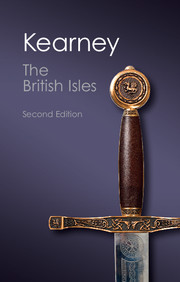Book contents
- Frontmatter
- Contents
- List of illustrations
- List of maps
- Preface to the first edition
- Preface to the second edition
- Map: the British Isles
- Introduction
- 1 The Celtic societies of the British Isles
- 2 The impact of Rome on the British Isles
- 3 The post-Roman centuries
- 4 The Vikings and the fall of the Old Order
- 5 The Norman and post-Norman ascendancy
- 6 The decline of the post-Norman empire
- 7 The making of an English empire
- 8 The remaking of an empire
- 9 The Britannic melting pot
- 10 The rise of ethnic politics
- 11 Between the wars
- 12 Withdrawal from empire
- 13 Post-imperial Britain: post-nationalist Ireland
- Afterword
- Selected reading list
- Index
- Frontmatter
- Contents
- List of illustrations
- List of maps
- Preface to the first edition
- Preface to the second edition
- Map: the British Isles
- Introduction
- 1 The Celtic societies of the British Isles
- 2 The impact of Rome on the British Isles
- 3 The post-Roman centuries
- 4 The Vikings and the fall of the Old Order
- 5 The Norman and post-Norman ascendancy
- 6 The decline of the post-Norman empire
- 7 The making of an English empire
- 8 The remaking of an empire
- 9 The Britannic melting pot
- 10 The rise of ethnic politics
- 11 Between the wars
- 12 Withdrawal from empire
- 13 Post-imperial Britain: post-nationalist Ireland
- Afterword
- Selected reading list
- Index
Summary
In 1931 Herbert Butterfield published a critical account of what he called the Whig interpretation of History, i.e. the abridgement of English history according to which freedom broadened down from precedent to precedent. In 1944, however, at the height of the Second World War he wrote The Englishman and His History, providing an eloquent defence of the Whig view.
Some nations have had a broken and tragic past. Others are new or have only recently arisen after a long submergence. Some have been torn by a terrible breach between past and present – a breach which, though it happened long ago, they have never been able to heal and overcome. We in England have been fortunate and we must remember our good fortune, for we have actually drawn strength from the continuity of our history. (Butterfield, The Englishman and His History (Cambridge, 1944), p. vi)
Earlier he had spoken of such a view as associated with ‘certain fallacies to which all history is liable’. Now he chose to celebrate it with ‘a robust but regulated pride, observing the part which an interpretation of history has played in building up the centuries [sic] and creating the England that we know’. He saw Englishmen developing that ‘whig interpretation which was never more vivid than in the great speeches of 1940’.
The Englishman and His History itself is a remarkable illustration of the strength of a nationalist interpretation of English history, one which was dominant in both schools and universities.
- Type
- Chapter
- Information
- The British IslesA History of Four Nations, pp. 322 - 324Publisher: Cambridge University PressPrint publication year: 2012



